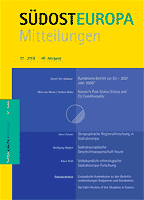Vom Nutzen der Kulturwissenschaften – Aufgaben und Perspektiven volkskundlich-ethnologischer Südosteuropa- Forschung
Cultural Sciences and their Practical Use – Tasks and Perspectives of Research of Cultural Anthropology on Southeast Europe
Author(s): Klaus RothSubject(s): Cultural Essay, Political Essay, Societal Essay
Published by: Südosteuropa Gesellschaft e.V.
Keywords: the process of EU enlargement; post-socialist transformation; Southeast European work migration
Summary/Abstract: The social relevance of the humanities has decreased over the last years in favour of the natural sciences, economics, or political studies – a shift that has also affected Southeast European Studies. Contrary to the focus of politics on economy and technology, the paper argues that the problems of transformation, EU enlargement and globalisation render the study of culture all the more necessary. This is particularly true for Southeastern Europe with its specific historical experience and position in the EU. The neglect of socio-cultural and mental factors (shaped by foreign rule and socialism) in the process of EU enlargement will have negative consequences. The paper points out six aspects demonstrating that the study of culture is of great relevance for the understanding of Southeastern Europe: (1) In no other European region has folk culture had such an impact on society and on the formation of nations. (2) Traditional folk culture provided the means for coping with religious, cultural, and linguistic diversity in the most heterogeneous part of Europe. (3) Folk culture was instrumental in the construction of the “own” in the processes of nation-building and also in socialism. (4) The fusion of traditional patriarchal folk culture with Western culture has produced unique forms of contemporary everyday culture, e.g. the “rurbanization” of cities. (5) Southeast European work migration has brought elements of traditional culture to Western countries. (6) The post-socialist transformation has led to processes of re-traditionalisation which run counter to the principles of civil society and the EU. From these facts and findings certain tasks and perspectives result for the cultural sciences, particularly for ethnology.
Journal: Südosteuropa Mitteilungen
- Issue Year: 2006
- Issue No: 01
- Page Range: 50-62
- Page Count: 13
- Language: German
- Content File-PDF

